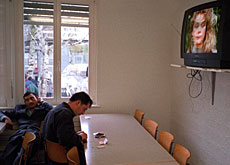Gerber leaves legacy of tighter asylum policy

The outgoing head of the Swiss Refugee Office, Jean-Daniel Gerber, has warned that the country's asylum policy is about to become harsher.
He has also urged Switzerland to join a European Union drive for a common asylum policy or face dealing with more bogus requests.
During a news conference in Bern – one of his last before stepping down at the end of March – Gerber also stressed that Swiss asylum policy faced many challenges in the coming year.
Foremost among them is the Refugee Office’s commitment to make savings of SFr137 million ($108 million) by 2006 as part of the government’s package of public spending cuts.
The first evidence of the effect those cuts will have will come on April 1 – the day Gerber is due to start his new job as head of the State Secretariat for Economic Affairs.
“We will have a new system for asylum seekers with manifestly unfounded requests,” he said. “Their social assistance will be cut to zero except in emergency cases.”
Asylum seekers whose requests have been rejected on these grounds will have to leave Switzerland within 24 hours, although the authorities will not expel anybody for five days.
Under the new regulations it will be up to cantonal authorities, rather than the Refugee Office, to foot the bill for asylum seekers whose applications have been rejected.
Human rights
Swiss non-governmental organisations such as the Swiss Refugee Council are concerned about the full impact both the cuts and the new law will have on asylum seekers.
The Council says that up to 8,000 people could end up being considered illegal immigrants and will turn to cantons, communes, churches and aid organisations for help.
NGOs are also worried that the asylum request procedure will be seriously undermined and question whether it is still in accordance with the European Convention on Human Rights.
“It is good that the process of dealing with applications is getting quicker,” Jürg Schertenleib of the Refugee Council told swissinfo.
“But we fear that the quality of those decisions has suffered. Applicants don’t have access to legal aid, and that makes it difficult for many of those whose requests are turned down to make an appeal.”
But the Refugee Office argues that genuine asylum seekers will not be turned away.
“These measures are supposed to frighten off some people [who are] coming here for medical or job reasons,” said Dominique Boillat, the Office’s spokesman.
Boillat added the policy’s success would be reviewed in a few months’ time.
European policy
During the conference, Gerber also stressed the importance of Switzerland reaching an agreement with the European Union on asylum policy in order to stop countries – including Switzerland – imposing ever more restrictive policies.
“What is happening is a ‘competition of misery’ in which each country has the most miserable system to discourage illegal immigrants,” he told swissinfo.
“It’s not a good development and what needs to be done is to harmonise the European asylum systems,” he added.
Although the EU already has a common policy on asylum – the Dublin treaty – Gerber maintained that so far it has not functioned very well.
But Brussels had taken up the challenge in starting the process of bringing all member countries’ policies into line, he said.
But he also emphasised the importance of Bern wrapping up its negotiations to sign up to the Schengen-Dublin agreements – the EU’s policy on cross-border crime and asylum.
“If we are not part of that system we may be faced with a lot of requests from asylum seekers whose applications have already been turned down in another European country,” he said.
“That means Switzerland may have to deal with a lot of rejected asylum seekers from the rest of Europe without even noticing it.”
Under the terms of Dublin, refugees may only make an asylum application in one signatory country.
If their request is turned down, they are not allowed to reapply to any other country party to the agreement.
swissinfo
By the end of last year, there were less than 90,500 refugees and asylum seekers in Switzerland, around the same number as in 1992.
This figure reached a peak of 130,000 during the Balkans war.
In 2003, the number of asylum requests dropped 20 per cent, to just over 20,800 demands.
Processing time for asylum applications has dropped. Last year, nearly 6,000 requests were handled in less than a week and 60 per cent in less than four months.
The Swiss Refugee Office’s spending dropped from SFr1.5 billion in 2000 to SFr920 million last year.

In compliance with the JTI standards
More: SWI swissinfo.ch certified by the Journalism Trust Initiative










You can find an overview of ongoing debates with our journalists here . Please join us!
If you want to start a conversation about a topic raised in this article or want to report factual errors, email us at english@swissinfo.ch.